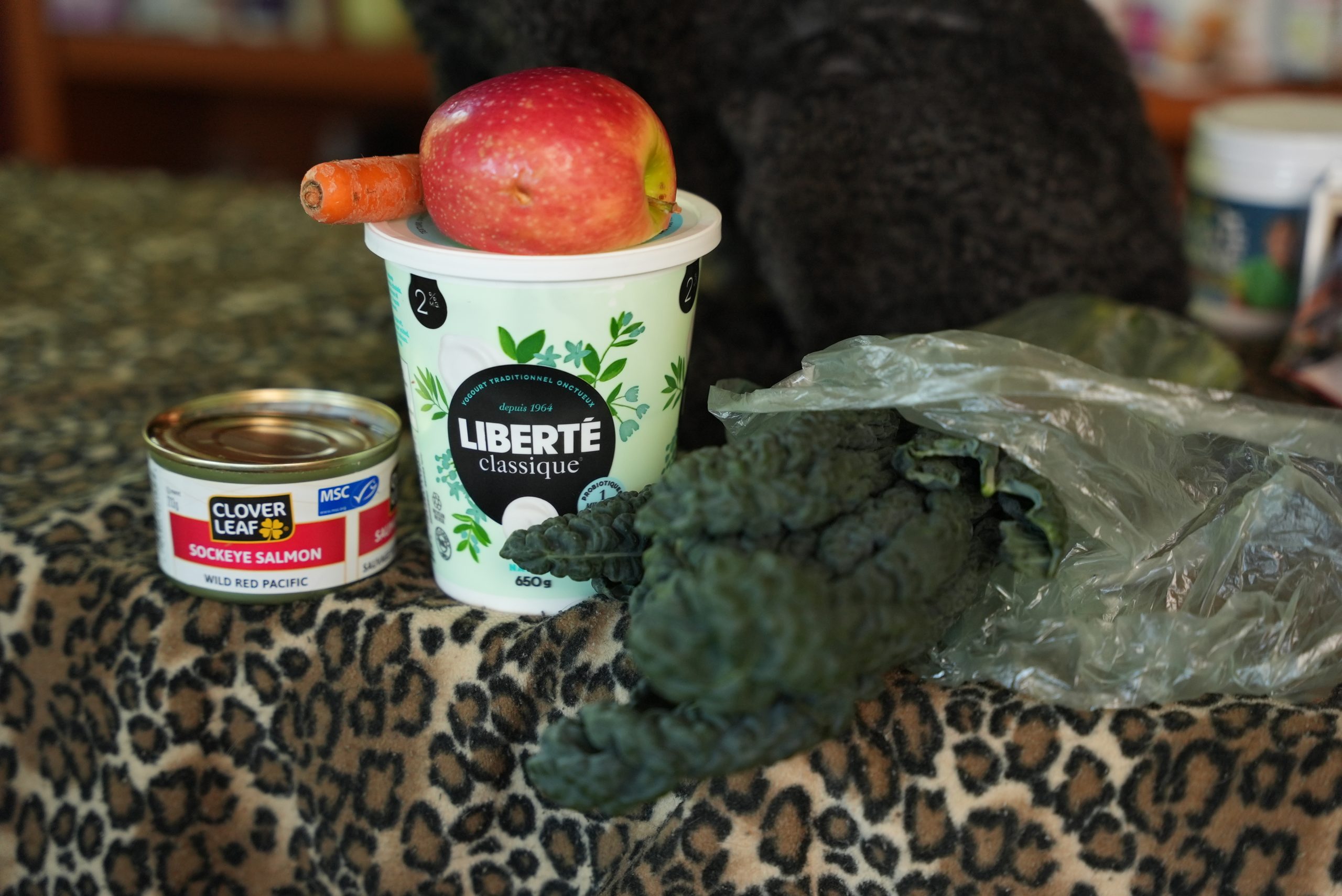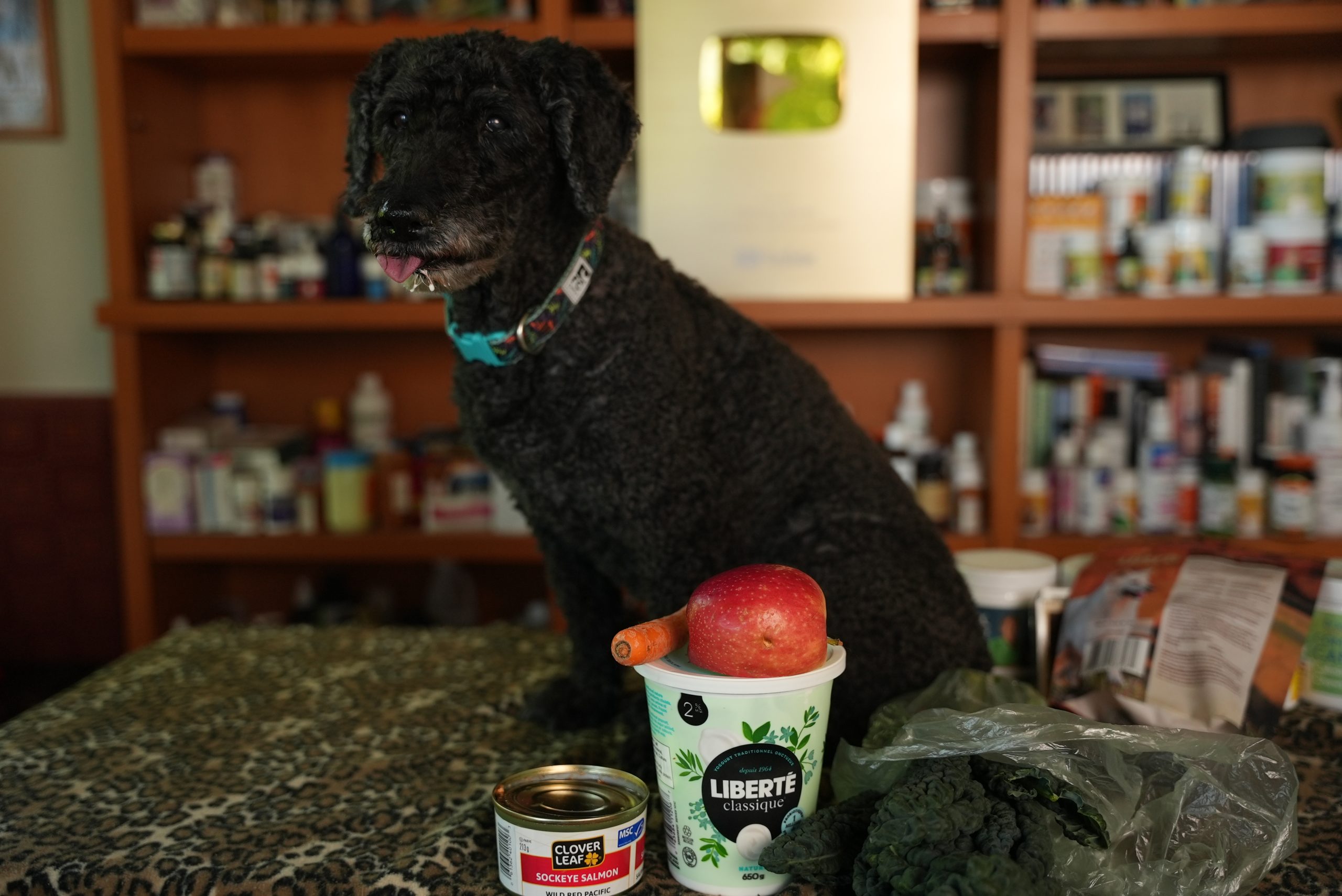5 Simple Human Foods That Could Help Prevent Cancer in Dogs
![]()
EFA or Essential Fatty Acids: A Powerful Cancer-Fighting for Dogs
Essential fatty acids, particularly EPA and DHA, which have been extensively studied for their powerful anti-cancer properties. These fatty acids help reduce chronic inflammation—an underlying factor linked to cancer—and have been shown to make it more difficult for cancer cells to grow. Including salmon in your dog’s diet can not only reduce cancer risk but also support overall health.
For those who want to take it a step further, Dr. Jones’ Ultimate Omega-3 Formula is an excellent option. Made with Antarctic Krill Oil, it’s packed with EPA and DHA to support your dog’s overall health and well-being. This formula can be a great way to ensure your dog is getting the essential fatty acids they need to stay healthy, reduce inflammation, and support cancer prevention.
By incorporating these omega-rich options, you’re taking an important step toward promoting your dog’s long-term health.
Dr. Jones’ Ultimate Omega 3 Formula
My Ultimate Omega 3 Formula, made with Antarctic Krill Oil, is packed with EPA and DHA to support brain health, reduce inflammation, and improve joint function. It’s great for dogs with DM, helping with mobility and reducing joint pain.


5 Simple Foods to Help Prevent Cancer in Dogs
Cancer is now the leading cause of death in dogs. It’s a tough reality for us as pet owners, knowing that one in three dogs will develop cancer at some point in their lives. The numbers get even worse for dogs over the age of 10, where over half will face the battle with this disease. But why is this happening? And more importantly, what can we do about it?
In today’s post, I’m going to dive into the main reasons why our dogs are getting cancer and, most importantly, share five simple and inexpensive human foods you can feed your dog that may help reduce their risk. These foods are packed with nutrients that can potentially make a huge difference for your dog’s health.
Why Are So Many Dogs Getting Cancer?
There are many factors contributing to the rise in cancer cases among our dogs. One major culprit is the food they eat. Unfortunately, many pet foods are packed with artificial preservatives, colors, and flavors—all linked to cancer. Additionally, the inside lining of pet food bags can leach BPA, a known carcinogen. But it doesn’t stop there. A recent study showed that some pet foods contain up to 500% more cadmium (a heavy metal linked to cancer) than cigarette tobacco! Yikes.
Not only are some pet foods contaminated with heavy metals, but they’re also filled with genetically modified organisms (GMOs), which may be sprayed with pesticides like Roundup. These toxins can make their way into your dog’s system, increasing the risk of cancer. And it’s not just their food—chemicals from lawns, vaccines, and even the age at which we spay or neuter our dogs can also play a role.
What Can You Do?
The good news is that there are steps you can take to minimize your dog’s exposure to these harmful toxins. Here’s what you can do:
-
Feed Your Dog Better Food
Choose high-quality pet food that avoids artificial preservatives, colors, and GMOs. Ideally, limit kibble and opt for home-cooked meals made with clean protein, vegetables, and sweet potatoes. You’ll be feeding your dog a much healthier, toxin-free diet. -
Vaccinate Less and Delay Spaying/Neutering
Vaccination can stress your dog’s immune system, and studies have shown that early spaying or neutering increases the risk of cancer. Try to delay the procedure until your dog is at least 2 years old. -
Minimize Toxin Exposure
Avoid exposing your dog to chemicals like pesticides, and be mindful of the food they consume.
Now, let’s talk about some simple, inexpensive human foods that could potentially help reduce your dog’s cancer risk.
1. Carrots: A Crunchy Cancer Fighter
Carrots are a powerhouse when it comes to fighting cancer. A 2005 study showed that Scottish Terriers, a breed with a high risk of bladder cancer, had a significantly lower risk of developing cancer when fed carrots three times a week. Why? Carrots are rich in antioxidants, particularly carotenoids, which are known to play a big role in cancer prevention. They’re also great for your dog’s teeth, especially if they like to chew on them.
For a dog around 20 pounds, a quarter of an average carrot, three times a week, is perfect.
2. Apples: A Tasty and Nutrient-Dense Snack
Apples are not just delicious—they’re also packed with nutrients and antioxidants. Specifically, apple peels contain flavonoids like keratin, which are beneficial for dogs with allergies and have potent anti-cancer properties. Additionally, apples are rich in a phenol compound called kaggen, which is also found in green tea and has antioxidant benefits. Finally, red apples contain anthocyanins, which have been shown to have cancer-fighting properties.
For a 20-pound dog, feed them a quarter of an apple, three times a week.
3. Kale: The Nutrient-Dense Vegetable
Kale is one of the most nutrient-dense vegetables around, packed with antioxidants and anti-cancer compounds. It has the highest measured amount of vitamin C of any vegetable, along with beta-carotene, flavonoids like kerosene, and glucosinolates—all of which have cancer-fighting properties. Kale has even been shown to induce cancer cell death, making it a top contender for cancer prevention.
For a dog weighing 20 pounds, feed them a quarter of a kale leaf, three times a week. You may need to cook it up for easier digestion.
4. Salmon: A Fatty Fish with Cancer-Fighting Power
Salmon is rich in EPA and DHA, essential fatty acids that have been extensively studied for their anti-cancer properties. These fatty acids help reduce chronic inflammation, which is linked to cancer, and have been shown to make it harder for cancer cells to grow. Including salmon in your dog’s diet can help decrease cancer risk and improve overall health.
For a 20-pound dog, feed them a quarter of a can of salmon three times a week. This will provide them with a healthy dose of essential fatty acids and protein.
5. Yogurt: Probiotics for a Healthy Gut and Stronger Immune System
Yogurt is packed with probiotics, which are beneficial bacteria that help maintain a healthy gut microbiome. A balanced gut microbiome means less inflammation and a lower chance of your dog developing cancer. Probiotics also play a role in detoxifying carcinogens and improving your dog’s immune system. A strong immune system is key in fighting off cancer.
For a dog around 10 pounds, a couple of tablespoons of yogurt, three times a week, should do the trick.
In Conclusion:
There you have it—five simple, affordable human foods that can help reduce your dog’s cancer risk. Of course, feeding these foods is just one piece of the puzzle. It’s also important to reduce exposure to toxins, vaccinate less, and delay spaying or neutering if possible.

EFA or Essential Fatty Acids: A Powerful Cancer-Fighting for Dogs
Essential fatty acids, particularly EPA and DHA, which have been extensively studied for their powerful anti-cancer properties. These fatty acids help reduce chronic inflammation—an underlying factor linked to cancer—and have been shown to make it more difficult for cancer cells to grow. Including salmon in your dog’s diet can not only reduce cancer risk but also support overall health.
For those who want to take it a step further, Dr. Jones’ Ultimate Omega-3 Formula is an excellent option. Made with Antarctic Krill Oil, it’s packed with EPA and DHA to support your dog’s overall health and well-being. This formula can be a great way to ensure your dog is getting the essential fatty acids they need to stay healthy, reduce inflammation, and support cancer prevention.
By incorporating these omega-rich options, you’re taking an important step toward promoting your dog’s long-term health.
Dr. Jones’ Ultimate Omega 3 Formula
My Ultimate Omega 3 Formula, made with Antarctic Krill Oil, is packed with EPA and DHA to support brain health, reduce inflammation, and improve joint function. It’s great for dogs with DM, helping with mobility and reducing joint pain.










Hi Dr. Jones!
Thank you for doing all these videos to educate us, I truly appreciate it. I noticed you uploaded a video this morning about cancer on YouTube, and before I could watch it, it’s already been taken off. How corrupt system we’re living in, right? I’m well aware of these things hence why I like to follow you and watch your videos 🙂 God bless you!
Edi